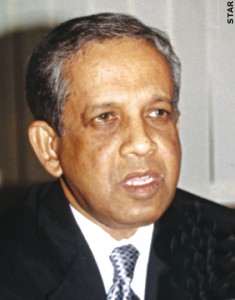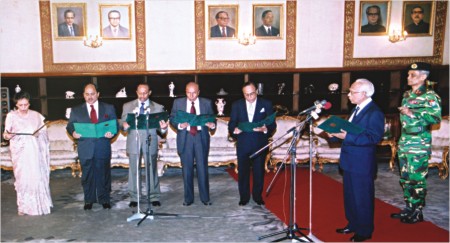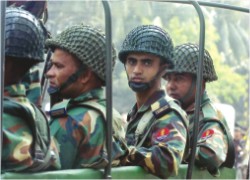
Inside
|
The Fakhruddin government: Rounaq Jahan sounds a note of caution as to the enormity of the task faced by the current administration
There is, however, a great deal of difference in the mood of the public in 1990 and 2007. In 1990, there was a great sense of expectation and hope that the end of military rule and the beginning of rule by democratically elected politicians would usher in a system of responsive and accountable government. But after three successive governments of elected political leaders, popular mood and expectation today are very different. There is no denying the fact that a large segment of the population, in fact the silent majority, are disappointed and disillusioned with the performance of the leaders they had elected to represent and govern them. This frustration with the undemocratic behaviour of popularly elected leaders, however, does not mean that people have lost faith in democracy or democratic elections. Their experiences of the last sixteen years have only deepened their understanding of the meaning of democracy and the complexities of establishing democratic institutions. While in 1990 people mostly equated democracy with four elements: political rule; free and fair election; free media, and civil and political rights; today people are much more aware of the fact that democracy means more than these four features. They understand what it means to live in an "illiberal" democracy. After three successive elections which failed to promote democratic practice within major political institutions, citizens of Bangladesh now have a more mature understanding and expectation. They want to maintain the achievements of the post-military rule: freedom of media and civil society, fundamental civil and political rights, and democratic competition through elections. But they want corrections of many of the democracy deficits they have witnessed. They want end of confrontational politics and agreement on rules of democratic competition and dissent; politics cleansed from the dominance of black money and muscle power; free and fair election without any attempt by state machinery to influence outcome; and practice of democracy within political institutions. But, above all, citizens want establishment of rule of law, where rule breakers will be punished and not flourish under state patronage. The challenge for the new government that assumed power on January 11 is thus immense. It has to meet people's expectations on both fronts; establishing good governance, and facilitating emergence of "true" democracy. How has the new government fared so far? What could be some of its major challenges? Three weeks is a short time to assess any government, particularly this new government, which has assumed power in a period of crisis, under emergency provisions, with undefined mandate, and without any visible advance preparation. Up to now the new government has been somewhat cautious and slow in divulging its plans. This has not been altogether a bad approach as it has enabled the government to gauge public opinion and be responsive. On several occasions the government had demonstrated its capacity to quickly rectify some mis-steps when media reports indicated potential negative public opinion. For example, the name of an adviser (Dr Faiz Khan) was withdrawn after adverse reports on him came out in the media. Similarly quick assurances were given to the media when it protested against the possibility of imposition of government control. These responsive actions have helped generate a degree of confidence in the new government but there is still a lot of anxiety about its future direction. This is understandable as the government has been installed under emergency provisions and draws its strength primarily from the support of the military who up to now has remained in the background. Very few people seem to know what the military is thinking and planning and who is calling the shots within the military. The reticence on the part of the government to elaborate a road map has provided space for a remarkably open debate in the media about the nature and role of the new government, the meaning of democracy and the constitution, the imperatives of governance and political reforms and prospects of changes in the existing political parties and/or emergence of new political formations. The discussions have articulated a wide range of positions held by members of civil society on a number of contested issues. They have also underscored consensus on selected issues. The emerging contestations as well as consensus should contribute positively in the decision making process of the Fakhruddin government as it starts detailing an agenda and plan for action. In his first address to the nation on January 21, Dr Fakhruddin Ahmed spelled out the broad outlines of a fairly ambitious agenda that underscore the government's intention to take on board the challenges of facilitating the process of both democracy and good governance. He emphasized several activities: organization of a free, fair and neutral election participated by all parties; reconstitution of the Election Commission (EC); preparation and publication of a flawless electoral roll; freeing the election process from the influence of black money and muscle power; scrutiny of the veracity of income and asset statement of candidates seeking election; de-politicization of civil administration; separation of judiciary from the executive; stern drive against "listed criminals, terrorists, godfathers, extortionists and anti-social elements;" and measures to curb price hike of essentials and increase power supply. He did not give any time frame for the election except to promise polls "at the earliest" after completion of all necessary measures to create "a congenial environment" for a "truly democratic" election.
There appears to be high level of public support in favour of the broad agenda presented by the chief adviser. However, opinions differ as to how much of this agenda the new government can and should undertake. Some favour completion of a limited number of tasks related primarily to organization of a free, fair and credible election such as the reconstitution and strengthening of EC, preparation and publication of a correct voters list, and depoliticization of officials involved in the election process. They argue that governance and political reforms activities such as cleansing politics from the influence of black money and muscle power and drive against corruption at the top should be left to an elected government. Some others, in contrast, posit that the current government, particularly with its military backing and non-partisan character, is best placed to start the reforms process, including weeding out political corruption, depoliticizing civil administration, and restoring the neutrality and quality of public institutions.The debate about the role of the Fakhruddin government demonstrates that people are aware of the relevant constitutional issues, (e.g. whether the government should be called caretaker or interim, and limits on its mandate) but for the time being are quite prepared to take a pragmatic position dictated by popular sentiment and the realities on the ground. Popular sentiment certainly demands that the government prioritize the good governance agenda, particularly punishment of crime and corruption at the top. But meeting this expectation will not be easy. Our past experiences of drives against high level crime and corruption have been short lived and only a few have actually been punished. Corruption cases are always difficult to prove in a court of law. The task before the Fakhruddin government is even more daunting than before. Crime and corruption have now become systemic. The livelihoods and fortunes of thousands of people are involved. The government needs to think through carefully how it will carry out and sustain its current drive against crime and corruption as it is bound to hurt the interests of many people, big and small. The initial steps of the Fakhruddin government -- separation of the judiciary from the executive, reconstitution of the EC with ACC in the offing, arrest of high profile political leaders who are alleged to be involved in corrupt and criminal activities -- have raised high hopes and expectation about the performance of the government. Raising people's expectations is always problematic because then the government has to worry about commensurate delivery. It is always prudent to promise less but deliver on the limited promises than promise a lot and fall short on delivery. The buzz on the streets and on the TV talk shows is one of a "fresh beginning." There is certainly a hunger to get out of the mess of malgovernance and undemocratic politics. Demand is high to sweep out all bad However, reforms can not be done by simply inside champions. They need outside allies. Today civil society and the media are obviously playing the role of outside advocates of reforms. But can civil society and the media mobilize and sustain constituencies of support? They can raise awareness and influence public opinion but mobilizing and sustaining constituencies is the task of political parties. The political parties have presence in every village of Bangladesh. Whether we like them or not we cannot wish them away. In fact, recent studies (BRAC State of Governance 2006 Report) show that in the last few decades the major political parties have strengthened their organizational presence down to the ward level in rural and urban areas. So it will be important for reform advocates to develop incentives/ disincentives so that the political parties will find it in their own interest to support the reforms agenda. So far, apart from providing lip service, political parties have not behaved in a way to convince anybody that they are serious about governance and political reforms. There is a lot of talk about the possibility of emergence of an alternative political party. But here again the proponents seem to be pinning their hopes on individual leaders i.e. such a party is on if a certain leader gives a call. If the alternative political party is again dependent on a charismatic leader, then how will the nation ever get out of the system of leadership-based politics? There are no easy options and no quick fix solutions to the problems that have mounted over the years. It will be wise for the current government to be frank about the difficult choices we all face and to take the people into confidence. The people will be able to handle hard facts about what is realistically achievable within a realistic time frame. Rounaq Jahan is a Senior Research Scholar, Columbia University, New York. Photos: Star & AFP |
 O
O
 (however defined) practices of the past and begin anew. But who will do it and how will it be done? Text books tell us that to carry out major reforms we need both inside champions and outside majority constituency support. Granted that the current council of advisers and their military power base will be the inside champions of reforms, but how will they ensure that the reforms will not be resisted or subverted by the very government machineries they head? After all reforms often get blocked during implementation by bureaucratic inertia and road block. Punishments work only for a limited time. Reform champions will have to figure out what kinds of incentive/disincentive structures they can put in so that the opponents can be neutralized and the majority of inside players will be won over to follow a rule-based system.
(however defined) practices of the past and begin anew. But who will do it and how will it be done? Text books tell us that to carry out major reforms we need both inside champions and outside majority constituency support. Granted that the current council of advisers and their military power base will be the inside champions of reforms, but how will they ensure that the reforms will not be resisted or subverted by the very government machineries they head? After all reforms often get blocked during implementation by bureaucratic inertia and road block. Punishments work only for a limited time. Reform champions will have to figure out what kinds of incentive/disincentive structures they can put in so that the opponents can be neutralized and the majority of inside players will be won over to follow a rule-based system.